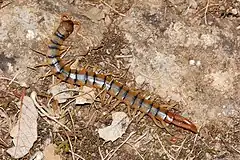Scolopendridae
Les Scolopendridae sont une famille de myriapodes chilopodes.
Description
Le corps est segmenté avec deux pattes par segment et la dernière paire de pattes postérieure est plus longue[1]. Les segments qui portent les pattes sont au nombre de 21 ou 23. Les pattes postérieures sont épaissies. Le premier ou le second article est épineux[2].
Systématique
La famille Scolopendridae a été initialement nommée Scolopendrides par le zoologiste britannique William Elford Leach[1] - [3] - [4] - [5] en 1814[6] - [7] - [Notes 1].
Certains auteurs peuvent ne pas reconnaître cette synonymie et considèrent que la paternité de cette sous-famille revient à George Newport (Scolopendridae Newport, 1844[2])[8] - [9] - [10] - [11] - [Notes 2].
Publication originale
- Leach, W. E. 1814 [1816]. A tabular view of the external characters of four classes of animals, which Linné arranged under Insecta; with the distribution of the genera composing three of these classes into orders, etc. and descriptions of several new genera. Transactions of the Linnean Society of London, 11(2): 306–400. (BHL) (Scolopendrides p. 381)
Liste des genres
Selon ChiloBase[12] :
- Akymnopellis Shelley, 2008
- Alipes Imhoff, 1854
- Alluropus Silvestri, 1911
- Arthrorhabdus Pocock, 1891
- Asanada Meinert, 1886
- Asanadopsis Würmli, 1972
- Campylostigmus Ribaut, 1923
- Collaria Porat, 1876
- Cormocephalus Newport, 1844
- Digitipes Attems, 1930
- Edentistoma Tömösváry, 1882
- Ethmostigmus Pocock, 1898
- Eurylithobius Butler, 1876
- Hemiscolopendra Kraepelin, 1903
- Notiasemus L. E. Koch, 1985
- Otostigmus Porat, 1876
- Psiloscolopendra Kraepelin, 1903
- Rhoda Meinert, 1886
- Rhysida Wood, 1862
- Scolopendra Linnaeus, 1758
- Scolopendropsis Brandt, 1841
- Sterropristes Attems, 1934
Notes et références
Notes
- La publication de William Elford Leach a été présentée devant la Société linnéenne de Londres les 19 avril, 3 mai et 1er juin 1814[1] mais a été publiée dans le 11e volume des Transactions of the Linnean Society of London daté de 1815 et dans la seconde partie datée de 1816. La date de 1814 fait préséance mais la littérature fait également mention des dates 1815[4] - [5] et 1816[3].
- Il est à noter que la publication de 1844 de George Newport attribue la paternité de la famille Scolopendridae à William Elford Leach[2] et que certains auteurs ont utilisé les deux noms d'auteurs pour la famille Scolopendridae[9] - [4] - [5] - [10].
Références
- Leach, W. E. 1814 [1816]. A tabular view of the external characters of four classes of animals, which Linné arranged under Insecta; with the distribution of the genera composing three of these classes into orders, etc. and descriptions of several new genera. Transactions of the Linnean Society of London, 11(2): 306–400. (BHL) (Scolopendrides p. 381)
- Newport, G. 1844. Monograph of the Class Myriapoda, Order Chilopoda; with observations on the general arrangement of the Articulata. The Transactions of the Linnean Society of London 19: 265-302, 349-439. (lire en ligne)
- Siriwut, W., Edgecombe, G. D., Sutcharit, C., Tongkerd, P., Panha, S. 2016. A taxonomic review of the centipede genus Scolopendra Linnaeus, 1758 (Scolopendromorpha, Scolopendridae) in mainland Southeast Asia, with description of a new species from Laos. ZooKeys 590: 1-124. (lire en ligne)
- Cupul-Magaña, F. G., Bueno-Villegas, J., Flores-Guerrero, U. S., Rodríguez-López, E. 2015. Ciempiés (Myriapoda: Chilopoda) depositados en la Colección Nacional de Arácnidos (CNAN) del Instituto de Biología, UNAM, México: registros recientes. Boletín de la Sociedad Entomológica Aragonesa (S.E.A.), 56: 364-366.
- Chagas, A., Jr, Edgecombe, G., Minelli, A. 2008. Variability In Trunk Segmentation In The Centipede Order Scolopendromorpha: A Remarkable New Species Of Scolopendropsis Brandt (Chilopoda: Scolopendridae) From Brazil. Zootaxa, 1888: 36-46.
- Siriwut, W., Edgecombe, G. D., Sutcharit, C., Panha, S. 2014. Brooding behaviour of the centipede Otostigmus spinosus Porat, 1876 (Chilopoda: Scolopendromorpha: Scolopendridae) and its morphological variability in Thailand. Raffles Bulletin of Zoology, 62: 339–351.
- Schileyko, A. A., Solovyeva, E. N. 2019. On the taxonomic position of the enigmatic genus Tonkinodentus Schileyko, 1992 (Chilopoda, Scolopendromorpha): the first molecular data. ZooKeys, 840: 133-155. (lire en ligne)
- Sherwan T. A., Fenik, Sh. H. 2016. First record of two Scolopendromorph centipedes; Scolopendra subspinipes Leach, (1815) and Scolopendra polymorpha Wood, (1861) with additional notes on Scolopendra cingulata Latreille, (1829) in Iraq. ZANCO Journal of Pure and Applied Sciences, 82(6): 471-428.
- Cupul-Magaña, F. G. 2011. Centipedes (Myriapoda, Chilopoda) of Biologia Centrali-Americana: Current status of the names, International Journal of Myriapodology, 5: 55-62.
- Chagas, A. Jr. 2012. The centipede genus Otostigmus Porat in Brazil: Description of three new species from the Atlantic Forest; A summary and an identification key to the Brazilian species of this genus (Chilopoda, Scolopendromorpha, Scolopendridae, Otostigminae). Zootaxa, 3280: 1-28.
- Simaiakis, S., Nesrine, A., Zapparoli, M. 2016. The centipedes of Peloponnisos and first records of genus Eurygeophilus in the East Mediterranean (Myriapoda: Chilopoda). Zootaxa, 4061(4): 301–346.
- Bonato, L., Chagas, A. Jr, Edgecombe, G. D., Lewis, J. G. E., Minelli, A., Pereira, L. A., Shelley, R. M., Stoev, P., Zapparoli, M. 2016. ChiloBase 2.0 - A World Catalogue of Centipedes (Chilopoda). Available at http://chilobase.biologia.unipd.it
Liens externes
- (en) Référence Catalogue of Life : Scolopendridae (consulté le )
- (en) Référence Fauna Europaea : Scolopendridae (consulté le )
- (en) Référence BioLib : Scolopendridae Leach, 1815 (consulté le )
- (en) Référence Animal Diversity Web : Scolopendridae (consulté le )
- (fr+en) Référence ITIS : Scolopendridae Leach, 1814
- (en) Référence NCBI : Scolopendridae (taxons inclus) (consulté le )
- (en) Référence uBio : site déclaré ici indisponible le 7 avril 2023
Cet article est issu de wikipedia. Text licence: CC BY-SA 4.0, Des conditions supplémentaires peuvent s’appliquer aux fichiers multimédias.
